
The influence of cultural beliefs on gambling habits

Every seasoned eye in this industry will tell you — gambling never happens in a vacuum. It sits on top of centuries of stories, myths, taboos, and traditions. People don’t just spin a reel or roll a dice for entertainment; they do it for reasons rooted deep in what they’ve been taught to believe, often without even knowing it. The unseen hand guiding the wager is culture itself. If you’ve ever wondered why players from one country prefer certain games over others, or why some communities gamble with caution while others embrace high-stakes risks like it’s second nature, it’s rarely just logic or luck. It’s a belief. I’ve seen this pattern across continents, from tightly regulated European countries to informal street setups you wouldn’t expect to be homes of ritual.
The influence of cultural beliefs on gambling habits
Every seasoned eye in this industry will tell you — gambling never happens in a vacuum. It sits on top of centuries of stories, myths, taboos, and traditions. People don’t just spin a reel or roll a dice for entertainment; they do it for reasons rooted deep in what they’ve been taught to believe, often without even knowing it. The unseen hand guiding the wager is culture itself. If you’ve ever wondered why players from one country prefer certain games over others, or why some communities gamble with caution while others embrace high-stakes risks like it’s second nature, it’s rarely just logic or luck. It’sa belief. I’ve seen this pattern across continents, from tightly regulated European countries to informal street setups you wouldn’t expect to be homes of ritual.
Role of superstition and ritual in player behaviour
Now this one deserves special attention. Many newcomers overlook just how embedded superstition is in gambling, dismissing it as frivolous nonsense. Big mistake. In cultures like China, lucky numbers — especially 8 — dominate lottery selections and even slot machine themes. I’ve observed players intentionally avoiding the number 4, considering it cursed due to its phonetic similarity to the word “death.” It changes how bets are made, where players sit, and even how a table game progresses. You can learn more about how cultural beliefs influence gambling behaviours in detail at Betspin’s article on online casinos. You’ve also got societies like Italy, where pre-spin rituals are sacred — touching the machine in a certain way or even speaking softly to their slot lever like it was a deity. Laughable to some, but to these players, it’s serious business. And what’s Casino Hold’em if not blessed and cursed in equal measure by the dealer’s hand, in the mind of someone raised in a belief-heavy community?
Collectivist vs individualist cultures and how they wager
There’s a stark difference between how people from collectivist societies (like many Asian and African nations) interact with gambling compared to their counterparts in Western, more individualistic regions. In collectivist cultures, gambling often has a communal flavour — it’s about group play, shared strategies, and, sometimes, honour. You’d be amazed how often players cite family reputation as a reason to avoid certain bets or chase a streak aggressively. This is especially true in areas such as South Africa’s gambling scene, where social bonds and community status still govern behaviours inside casinos. Compare that to your average European slot player who’s hunting solo for maximum RTP, and the contrast is staggering. One’s risking the group’s pride, the other’s chasing a personal win streak.
Perceptions of luck, fate and karma
Let’s slice this onion a bit further. In some belief systems, luck isn’t just luck — it’s a spiritual force. In the Philippines or India, karma and divine will often dictate when someone believes it’s their “time” to win. I’ve sat next to players who genuinely believe their winnings or losses are part of a cosmic retribution, not randomised mechanics. That’s why games like baccarat gain popularity — they fit cleanly into these philosophies with their repeating patterns and cycles. Meanwhile, in secular or scientifically oriented countries, there’s generally more trust in RNGs and statistical probability. The modern punter might want to know the exact house edge definition before they stake a penny — a testament to a different kind of cultural belief: logic.
Religion and legal framing
Religion, of course, throws its own dice into this mix. Nowhere do cultural beliefs wield more legislative power than when religious doctrine becomes law. In Islamic countries, where gambling is haram, the very definition of “betting” is shaped by faith. Even informal games among friends can carry heavy social consequences. Juxtapose that with secular states where online gambling is widespread and highly regulated, like parts of Europe, where even religious influence has long retreated from the legal domain. What’s intriguing is how even within religious populations, underground gambling thrives — often disguised as raffles or social games — threading itself through tightly held moral codes like a needle through cloth.
The impact on game selection and platform trust
Cultural belief also shapes preferences — not just in gameplay but where the game is played. In my years observing user behaviour on global platforms, it’s crystal clear that trust in the operator is often cultural. For example, one reason LeoVegas remains popular in Scandinavian societies isn’t just the interface; it’s that players believe it mirrors their national standards of regulation and fairness. Likewise, players from high-context cultures tend to stick to legacy brands or platforms endorsed by people they trust. It’s brand loyalty, yes — but driven not by advertising, by deeply coded cultural norms that weigh familiarity far heavier than technical specs.
Final thoughts on cultural influence in gambling
You can’t separate gambling from culture – not now, not ever. Strip it down to math and strategy all you want, but once you’re at the table — whether digital or felt — what really kicks in is heritage. Understanding cultural beliefs isn’t just academic curiosity; it’s critical if you truly want to get inside the psyche of a gambler. Ignore it, and you’re flying blind. Embrace it, and everything — the bets, the wins, the losses, even the silence between games — starts to make sense. That’s the difference between reading the board and actually knowing the game.
 Related Blog posts
Related Blog posts

